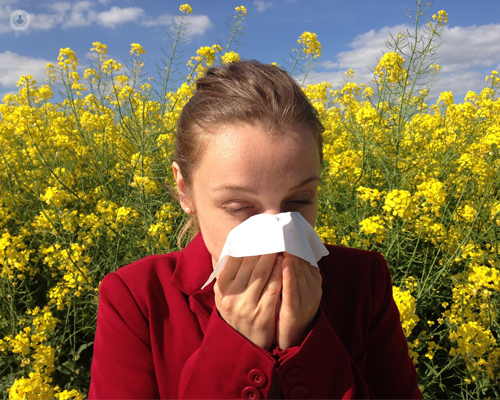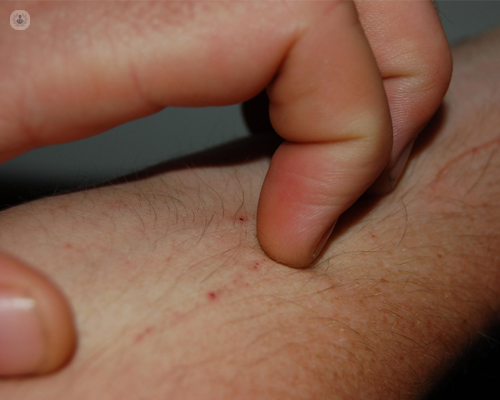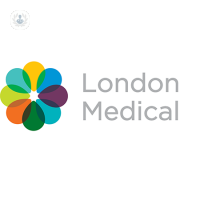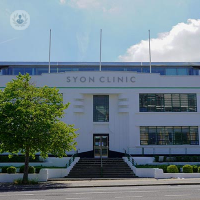Allergic reactions
Mr Richard Hewitt - Paediatric otolaryngology
Created on: 11-13-2012
Updated on: 12-13-2023
Edited by: Lauren Dempsey
What are allergic reactions?
Allergic reactions are hypersensitive responses to contact with certain substances known as allergens. Your body's immune system will perceive these harmless substances as a threat and will defend against them. The reaction may be localised to one area of the body or it may spread throughout the body.

What causes allergic reactions?
When someone inhales, consumes, or touches the allergen, their immune system reacts in a variety of ways. Although we have a good idea of the most common causes of allergic reactions, it is not yet clear why some people are allergic and others are not. However, it appears to be the case that if you have a family member with a particular allergy you are more likely to have that allergy as well.
How common are allergic reactions?
Allergic reactions are very common, affecting 25% of the UK’s population at some stage in their life. Children commonly suffer from allergic reactions; some children will grow out of them whilst others will have lifelong allergies. Adults can also develop allergies that they didn’t previously have.
What are the different types of allergic reactions?
There are four types of allergic reactions, classified by how long it takes for the symptoms to develop:
- Type I (Immediate) symptoms develop within a few seconds to minutes.
- Type II (cytotoxic) symptoms develop within a few hours to minutes.
- Type III (immune complex-mediated) symptoms develop after several hours.
- Type IV (delayed hypersensitivity) symptoms develop days later.
What are the most common allergies?
The most common allergic reactions are caused by the following substances:
- pollen (known as hay fever)
- bites or stings from insects
- animal dander (tiny flakes of skin from animals with fur)
- dust mites
- mould
- latex
- certain plants
- certain medicines, like penicillin, ibuprofen, aspirin, certain antibiotics
Common foods that cause allergies are:
- nuts
- fruit
- shellfish
- eggs
- milk from cows
How do I know if I'm having an allergic reaction?
If you come into contact with an allergen, symptoms will typically develop within a few minutes of exposure, but sometimes it can be more gradual and take a few hours.

What are the signs or symptoms of an allergic reaction?
In some cases, the symptoms are mild and only a minor annoyance, while in other cases the reaction can severe and involve life-threatening symptoms.
The most common symptoms of a mild allergic reaction include:
- localised itching
- red or watery eyes
- rash
- nasal congestion
- neck and face hives.
In a moderate or serious allergic reaction symptoms may include:
- abdominal pain
- chest discomfort or tightness
- diarrhoea
- swelling in different parts of the body
- nausea and/or vomiting
- loss of consciousness
- dizziness
- difficulty breathing or swallowing
The most severe type of allergic reaction is known as anaphylaxis, which is a sudden combination of restricted breathing and a sudden drop in blood pressure.
How long does it take for an allergic reaction to go away?
The duration of the reaction may vary greatly. Typically, the symptoms will go away in a few hours or maybe even a few days. If there is constant exposure to the allergen, for example, pollen in Spring, it may last for weeks or even months.
When should you go to the hospital for an allergic reaction?
If the person having the reaction displays severe symptoms and, in particular, is struggling to breathe, immediately seek medical attention and call an ambulance.
How is an allergic reaction diagnosed?
To diagnose an allergic reaction the doctor will usually carry out a clinical examination and ask about your history of symptoms. If it is not clear what caused the reaction, there are a number of tests that can be carried out to help identify the cause, including:
- challenge tests – usually carried out to diagnose a food allergy, this test involves eating the food under the supervision of a doctor and seeing if it causes an allergic reaction
- blood tests – this measures an allergy antibody known as the IgE (Immunoglobulin E) antibody, to see if it has altered in response to an allergen
- skin prick tests – this involves placing a drop of the allergen on the arm and using a small tool to look for any micro-reaction
How can they be prevented?
The main way to prevent allergic reactions in the future is to identify what is causing the reaction and take steps to avoid contact with the substance in the future.
However, it is not always possible to prevent yourself from coming into contact with an allergic substance, particularly if you have a high sensitivity to it. Therefore, for more severe types of allergies, for example, those which cause difficulty breathing or anaphylaxis, the doctor may advise you to carry medication with you at all times to mitigate and control the symptoms.
What is the treatment?
Treatment for an allergy depends on the type of allergic condition. For example, if you have a severe food allergy, your care plan will look different for someone who has asthma. Some types of allergies can be cured with a programme of immunotherapy, which involves regular controlled exposure to the allergen to build up your body’s tolerance.
However, for most people allergic reactions can be treated with a number of medications, including:
- antihistamines which relieve the symptoms of hay fever, hives, and insect stings
- steroid cream or tablets to reduce inflammation
- decongestant to treat a blocked nose
What is the prognosis?
By preventing known allergies, you can improve the prognosis, but the out-look really depends on how severe the reaction is. In mild cases, prompt treatment will ensure a good chance of recovery. In more severe cases, it is essential that emergency care is received quickly as anaphylaxis can rarely cause death.
What specialist should I see?
An allergist is a specialist who can diagnose and treat allergic reactions and the underlying allergy involved.

















